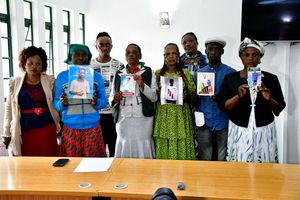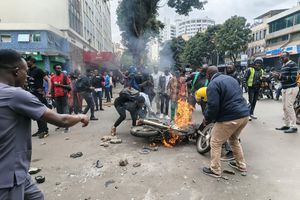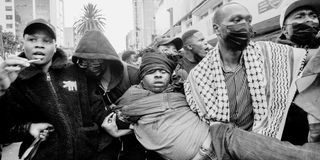
Face mask vendor Boniface Kariuki is rushed to hospital by protesters after he was shot by a police officer in Nairobi on June 17, 2025.
“We will kill you”, Sheriff Wayne Ivey of Brevard County in the US State of Florida warned on June 13 ahead of planned nationwide demonstrations against President Donald Trump’s administration. The video, which has gone viral globally, has become the inspiration in Kenya for MPs loyal to President William Ruto.
As anti-government demos rose in reaction to police murder of schoolteacher Albert Ojwang, which coincided with the first anniversary of the GenZ revolt, a top official in the Executive shared the video on a Kenya Kwanza Parliamentary Group chat forum, prompting excited support from ruling party MPs advocating similar measures. Some pro-state bloggers have been pushing the clip and the line of thinking on social media as a legitimate response to youth-led protests. The aim appears to be to spread fear and discourage protests while at the same time justifying police brutality.
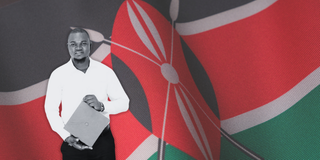
Teacher Albert Ojwang who mysteriously died in a police cell.
Sheriff Ivey had warned at a press conference that protestors who impeded traffic, blocked roads, resisted arrest of turned violent towards law enforcement officers that “We will be notifying your family where to collect your remains at, because we will kill you graveyard dead”.
The warning was aimed at those who might turn violent, with the Sheriff clarifying that those who remained peaceful were free to protest, but it nevertheless drew sharp criticism the Florida chapter of the American Civil Liberties Union (ACLU).
The human rights lobby warned law enforcers that they would be liable to pay millions of dollars in damages if they used excessive force against protesters.
"Sheriff Wayne Ivey’s violent and provocative threat to 'kill' protesters exercising their First Amendment rights is extremely un-American, and unbecoming for an elected leader sworn to protect the public," ACLU warned in a post on social media.
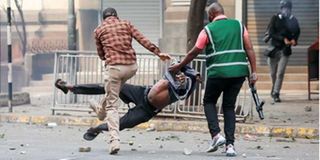
Plainclothes police officers tackle a suspected thief along Kenyatta Avenue in Nairobi on June 17, 2025, during protests.
The video of the sheriff’s warning quickly went viral, being held up as an example of an increasingly authoritarian swing under the Trump administration. But in Kenya ruling party politicians seized on for inspiration on how to handle anti-government demos.
Ahead of protests earlier this week demanding the arrest of Deputy Inspector-General of Police Eliud Lagat over Ojwang murder, the top official shared the Sheriff Ivey clip on a Kwanza MPs chat group.
He did not make any comment, but MPs seized on the Ivey warning to support similar tough action against protestors in Kenya.
“We cannot let our country get destroyed during our time at the helm”, responded an MP from Nyeri county
“Can’t agree more”, chimed in another one from Kirinyaga County as a counterpart from Busia said “it’s got to be that way. Very true”
A Nairobi MP was also in agreement: “The opposite of it … is anarchy”, with the stand being supported by a legislator from Uasin Gishu County who urged that those commenting should “add volume”.
The following day, as protests resumed in Nairobi’s city centre, a policeman shot a 22-year old street vendor, Boniface Mwangi Kariuki, in the head at point blank range. The unprovoked action captured on video by both mainstream media and citizen journalists shocked the nation, and called into question, once again, police excesses.
The young man was not one of the demonstrators. The videos which have since gone viral showed clearly that he was not throwing stones, looting, resisting arrest or provoking the police in any way, but had simply seized a business opportunity to sell face masks.
Once videos of the incident went viral. Inspector-General of Police Douglas Kanja ordered immediate arrest of the officers involved. Constables Klinzy Baraza and Duncan Kiprono appeared in court on Thursday and were ordered held for 15 days as investigations continued. The victim, Kariuki, meanwhile was fighting for his life at the Kenyatta National Hospital where he had undergone surgery to remove bullet fragments from his brain.
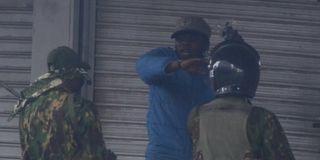
Screen grab of a video showing the man shot in the head by police.
Like Ojwang some 10 days earlier, Kariuki became a symbol of human rights abuses that have shocked the nation and left the government scampering into damage control mode.
Ojwang was arrested on June 8 at his home in Homa Bay County by a squad of detectives sent all the way from Nairobi to investigate a social media post allegedly defamatory of Lagat. He was driven to Nairobi, and the same night battered to death in a cell at the Central Police Station.
A brazen cover-up attempt in a police statement attributing the death to suicide, alleging that Ojwang banged his head against the cell wall fell flat. The Independent Policing Oversight Authority took up the matter and interrogated scores of officers from Central Police Station, but seemed to tread warily around Lagat until sustained public pressure finally forced them to summon him for interrogation more than 10 days later.
It was Lagat’s complaint about the social media post that led to Director of Criminal Investigations Mohammed Amin dispatching a squad from the Serious Crimes Unit to arrest Ojwang.
The matter was also taken up by Parliament, with both Kanja and Amin, as well as IPOA chairman Ahmed Isaac Hassan and Interior Cabinet Secretary Kipchumba Murkomen facing questioning before separate National Assembly and Senate committees’ sittings.
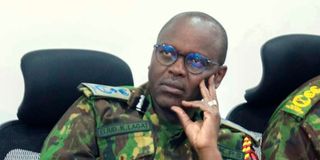
Deputy Inspector-General of Police Eliud Lagat.
The National Assembly has summoned Murkomen again next week after MPs expressed dissatisfaction with the report filed by IPOA. MPs will want to know why Lagat was treated with kid gloves and given the luxury of voluntarily ‘stepping aside’ while other suspects were immediately suspended from office. They are also querying why DCI boss Amin treated Lagat’s complaint of defamation as a serious crime, dispatching a special squad from Nairobi to arrest Ojwang and bring him to the capital city instead of entrusting the investigation to the DCI office in Homa Bay.
It is also likely that Murkomen will be taken to task on the extraordinary scenes witnessed in Nairobi last week where police worked in tandem with a vigilante squad of civilians armed with whips, machetes and hoe handles to quell protests.
Meanwhile, the killings of Ojwang and the shooting of Kariuki in the run-to the first anniversary of the GenZ uprising are two separate and unrelated incidents that have galvanised anti-government sentiment. The political opposition, civil society, religious groupings and other human organisations are expected to join forces with the GenZ movement to commemorate the seismic event of June 25 last when protestors stormed parliament.
Leaders of the mainstream opposition grouping, including former Deputy President Rigathi Gachagua and Wiper Party boss Kalonzo Musyoka will be keen to capitalise on the situation. Former Chief Justice David Maraga has also gained increased visibility for his otherwise low-key presidential campaign, and is expected to link up with protestors next week in addition to pursuing the option of private prosecution if the government does not act on Ojwang killing.
The confluence of events has also placed ODM leader Raila Odinga in a quandary. The former opposition chief was quick to issue a string statement on the Ojwang murder, emphasising that his party entering a pact with Ruto’s governing coalition does not entail condoning acts of repression.
Ruto and Raila have sought to quell the flames by separately calling Ojwang’s father and making it public that they have contributed large amount in cash donations, supposedly to meet funeral expenses but to critics this are attempts to buy his silence.
Read: Albert Ojwang's father recounts last moments before ‘friendly’ DCI officers took his son from home
Some of Raila’s troops who have previously been unwavering in support for the broad-based government arrangement, notably Homa Bay governor Gladys Wanga and Suba North MP Millie Odhiambo have now openly turned sharply critical, condemning the government for extra-judicial executions and other human rights abuses they insist ODM is not party to.
It remains to be seen, however, to what extent public anger will ignite the demonstrations planned for next week. The two rounds of protests witnessed so far since the Ojwang murder had only moderate attendance, with the main news generated mostly by the heavy-handed government reaction, including the sponsoring of armed goons to go orgies of looting and plunder.
The GenZ revolt of last year shook the Ruto government to the core, forcing it into a shotgun marriage with Raila’s party to both blunt public discontent and also counter flight of the populous Mt Kenya base following impeachment of Gachagua.
Without Raila’s fervent support base in action, it might be difficult to mobilise tens of thousands into the streets, especially in big towns outside Nairobi—such as Mombasa, Nakuru and Kisumu—where anti-government action might be seen as a Gachagua or Mt Kenya affair.

